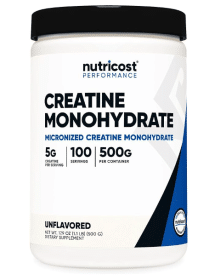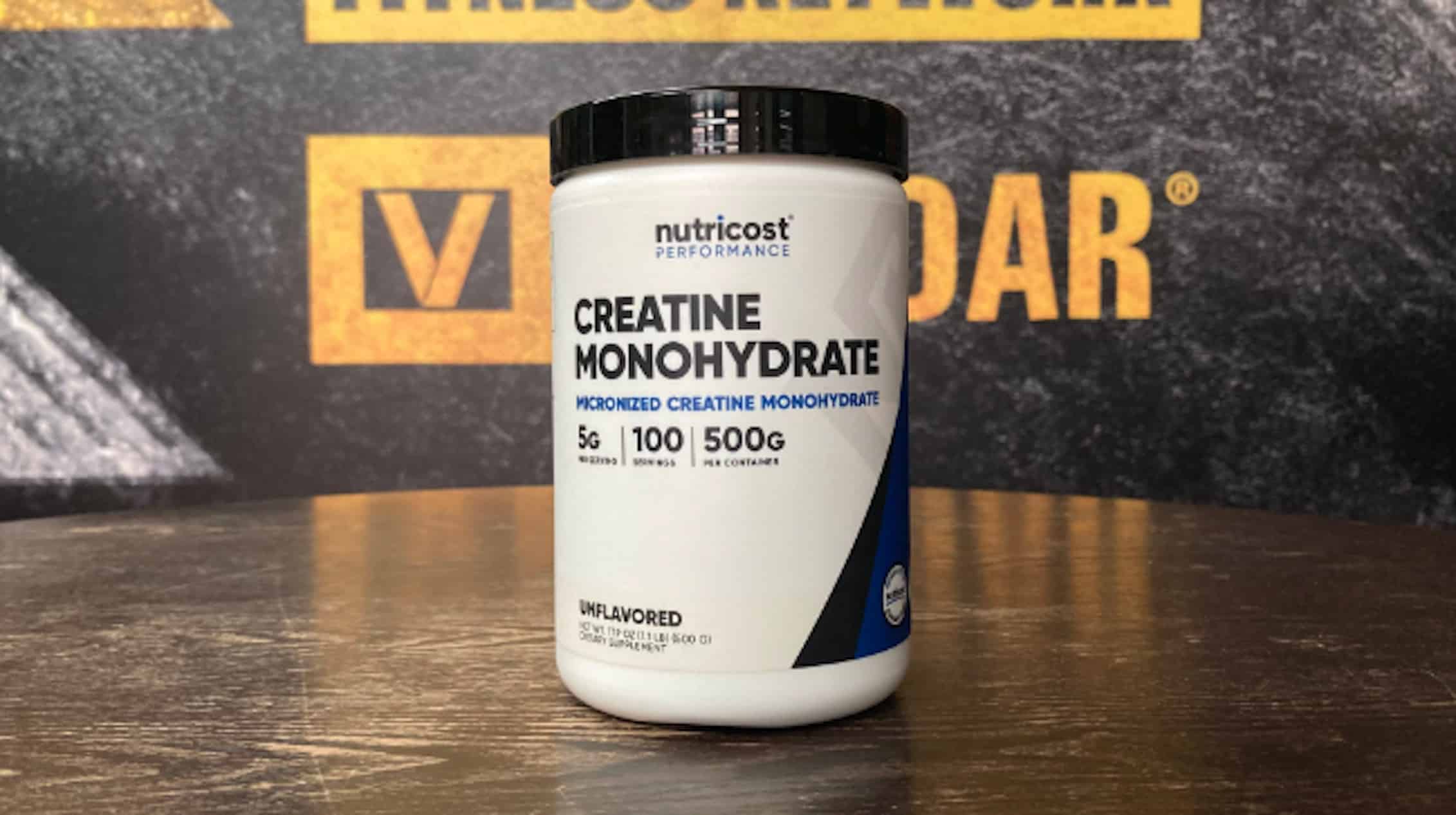Creatine often stays good years after its expiration date. Or does it?
When it comes to supplements, creatine is a favored among bodybuilders, fitness enthusiasts, and athletes of all kinds, distinguished by its extensive research backing. Studies indicate that creatine boosts muscle mass, enhances performance, and may offer protection against neurological conditions (1). Moreover, it’s widely available at affordable costs, with various choices across numerous brands – certain supplements offer up to 200 servings in a single container. But does creatine ever expire?
You might find yourself with expired creatine for multiple reasons, including changes in routine or simply forgetting that it is in the back of your supplement cabinet. And if it’s expired, it won’t be as effective. So, is it time to discard this expired supplement and purchase a new batch to keep your gains coming?
This article comprehensively examines creatine, delving into its different forms. It also guides you on the steps to take if your creatine has expired. Additionally, you’ll discover advice on proper storage methods and gain insights into the actual shelf life of this supplement, regardless of what the label may indicate.
What Is Creatine?
Creatine is an amino acid that doesn’t play a role in protein formation. Despite this, creatine is beneficial for building lean muscle, and 95% of it occurs in the muscles as phosphocreatine. The other 5% is in the testes and the brain.
You can get creatine from foods such as seafood and red meat. It also occurs naturally in the body, but you can take a supplement to increase your stores, leading to higher amounts your muscles can utilize. As a result, your exercise performance will increase, allowing you to lift more weight and do more reps to build muscle.
(If you want the best rated creatine supplement, here is a quick answer!)
Types of Creatine
There are several types of creatine available in the market. Some of them include:
- Creatine Monohydrate: This type of creatine has a single molecule of water combined with that of the creatine.
- Creatine HCL: Creatine HCL is an advanced version with an added hydrochloride molecule to help improve the solubility and absorption of the creatine.
- Creatine Malate: Creatine malate has three molecules of creatine combined with one molecule of malic acid using an ester bond. While this helps with absorption, this creatine variant can be pricey.
- Buffered Creatine: Buffered creatine has an alkaline powder supplement added to help stabilize the creatine in your stomach.
- Creatine Citrate: Creatine citrate is mixed with citric acid, which helps with its water solubility. However, absorption and efficacy rates are the same as the traditional forms of creatine.
- Creatine Magnesium Chelate: The creatine molecule chemically bonds with the magnesium in creatine magnesium chelate.
- Creatine Ethyl Ester: Creatine ethyl ester is almost like creatine monohydrate. However, it contains an added ester to help absorb and reduce bloating and dehydration. The ethyl group can increase the time it takes for creatine to degrade and lose effectiveness.
Of all these types of creatine, creatine monohydrate is the most researched (2).
How Does Creatine Work?
As you’ve seen above, creatine increases your body’s store of phosphocreatine. The human body uses adenosine triphosphate (ATP) for energy. When this energy runs low, your body uses the phosphocreatine stores to create more.
When you take creatine supplements, you’ll have more phosphocreatine available, allowing you to train for longer and recover faster. Creatine also helps with cell signaling and raises your anabolic hormones (3).
Creatine & Expiration Dates
Most creatine supplements expire between 2-3 years after their production. However, creatine monohydrate, the most viable form of creatine, can last longer. Research shows that even when kept at high temperatures, creatine monohydrate only started showing signs of breakdown after four years (4).
In addition, many companies need to pay more attention to the shelf life of their products. According to this study, 88% of the products tested lasted for as long as five years after their expiry date. So, while the date on your container might say expired, creatine monohydrate, especially, can last several years after that. Other forms are more likely to break down more quickly.
How Does Expired Creatine Look?
You might notice changes in your creatine’s texture when it has expired or is nearing its expiry date. However, most changes you see in your creatine result from improper storage. Some of these include clumping, change in odor, color changes, and a foul taste.
If you notice clumping in your creatine, especially before the expiry date, it’s most likely a result of moisture. Clumped creatine could still be safe to consume, meaning several creatine molecules have picked up water. If the clumping comes with changes in smell, color, and texture, it might be time to get a new one.
Expired Creatine Side Effects
Creatine is safe to consume and can last several years after its expiry date. Plus, clumpy creatine is not a sign that it has expired. It may still be safe to consume and effective.
However, you should know that leaving creatine open and exposed to moisture for a few days could cause it to lose its potency. If you notice a change in odor, color, or taste, stop taking it. These changes could indicate the presence of bacteria, but that rarely occurs and only happens if you leave your supplement open at room temperature for several days. Aside from that, creatine past its expiry date is unlikely to make you sick.
How to Properly Store Creatine
Product packaging will likely contain instructions on how to store creatine properly. In general, however, you should keep your creatine in an airtight container under dry conditions, and if it comes with a silica pad, keep that in it. Exposing creatine to high conditions and direct sunlight could also accelerate its breakdown.
FAQs
How long can you keep creatine?
Most creatine supplements can last up to 2-3 years after expiry. With proper storage, your creatine supplement could serve you for even longer.
Is creatine still good if it hardens?
If kept in a place with high humidity, creatine could harden. As long as it has not expired, it’s still effective. Hardened creatine could, however, be less soluble and harder to mix with other liquids.
Does creatine go bad in water?
Once dissolved in water, creatine has a half-life of 12 hours if left at room temperature. You should do your best to ensure that you avoid moisture getting into your creatine pack when making use of it.
Our Favorite Creatine
Get all of the benefits of micronized creatine without breaking the bank and activate muscle building quickly.
Nutricost Creatine is a creatine monohydrate supplement that aims to provide users with a convenient and high-quality source of this essential compound for a great price. It boasts a simple and effective ingredient list, with 100% monohydrate as the sole active component. This simplicity ensures that users are getting a high-quality and unadulterated form of the supplement, free from unnecessary additives and artificial ingredients that could have nasty effects on you.
Read the full Nutricost Creatine review here!
More on Creatine
Now that we have established if creatine expires, take a look at some other pieces that involve the supplement!
- Complete Guide To Creatine Supplements for Muscle Mass
- Creatine Vs. Pre-Workout: Which Boosts Performance Better?
- Understanding The Best Type Of Creatine For Gains
- The Do’s and Don’ts of Creatine
- Mixing Pre-Workout With Creatine Could Take Your Gains to New Heights
Follow us on Instagram, Facebook, and Twitter for more nutrition information!
References
- Gualano, B., Roschel, H., Lancha, A. H., Jr, Brightbill, C. E., & Rawson, E. S. (2012). In sickness and in health: the widespread application of creatine supplementation. Amino acids, 43(2), 519–529. https://doi.org/10.1007/s00726-011-1132-7
- Kreider, R. B., Jäger, R., & Purpura, M. (2022). Bioavailability, Efficacy, Safety, and Regulatory Status of Creatine and Related Compounds: A Critical Review. Nutrients, 14(5), 1035. https://doi.org/10.3390/nu14051035
- Cooper, R., Naclerio, F., Allgrove, J., & Jimenez, A. (2012). Creatine supplementation with specific view to exercise/sports performance: an update. Journal of the International Society of Sports Nutrition, 9(1), 33. https://doi.org/10.1186/1550-2783-9-33
- Jäger, R., Purpura, M., Shao, A., Inoue, T., & Kreider, R. B. (2011). Analysis of the efficacy, safety, and regulatory status of novel forms of creatine. Amino acids, 40(5), 1369–1383. https://doi.org/10.1007/s00726-011-0874-6












